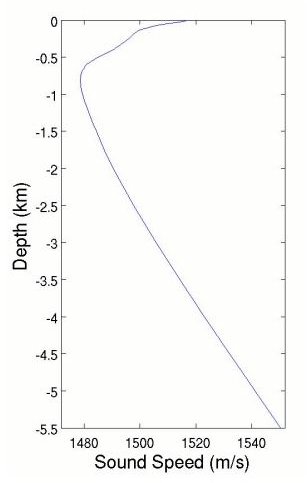Why is the Speed of Sound Faster in Seawater than Air?
Sound Propagation in Sea Water
The speed of sound in seawater is different from the speed of sound in air, which is different from that in oil, and so on. Sound’s speed in seawater is of particular interest to anyone trying to use sonar or other underwater exploration techniques.
The speed of sound in sea water is, on average, about 1560 m/s, or 3490 mph. Compare this to the speed of sound in air, which is 343.2 m/s. The discrepancy is obvious: sound travels nearly five times faster in seawater than in dry air! Why does sound travel faster in seawater (and other mediums) than in air?
The difference is caused in large part by the different ways that sound is transmitted in gases, solids, and liquids. Speed of sound transmission in liquids depends largely on the compressibility and density of the medium in question. The speed of sound is variable and depends on the properties of the substance through of which the wave is travelling. In solids, the speed of longitudinal waves depends on the stiffness to tensile stress, and the density of the medium. In fluids, the medium’s compressibility and density are the important factors. In gases, however, the speed of sound is dependent only on temperature, since density and compressibility of ideal gases are dependent on temperature.
The speed of sound can be found according to the following formula: c=(C/p)1/2 where c is the speed of sound, C is the bulk modulus, and p is the density. Because shear forces do not exist in liquids, the only type of deformation possible is a volumetric one. The above formula switches C with K, the bulk modulus, for fluids. The bulk modulus is a measure of resistance to volumetric deformation.
Speed of Sound is faster in Seawater
The speed of sound in seawater is very fast compared to that in air – nearly five times faster. In fact, sound travels even faster in seawater than in freshwater. However, the speed of sound in seawater is not at all constant. It can change substantially depending on several factors, as you will read in the following section.
Image: Wikimedia Commons - Speed of Sound in seawater as a function of depth
How to Calculate Sound Velocity in Seawater
The speed of sound in seawater is dependent largely on three factors: pressure, temperature, and salinity. Pressure increases with depth, so the speed of sound does too. In general, an increase of temperature of 1oC increases sound speed by 4 m/s and an increase in salinity of 1% increases sound’s speed by 1 m/s. Several researchers have developed simple formulas for determining the speed of sound in seawater.
One commonly used formula is Wilson’s formula, developed in 1960. The formula is as follows:
c(S,T,P) = c0+DcT+DcS+DcP+DcSTP
where
c0=1449.14
DcT=4.5721T-4.4532*10-2T2-2.6045*10-4*T3+7.9851*10-6T4
DcS=1.39799*(S-35)-1.69202*10-3(S-35)2
DcP=1.63432P-1.06768*10-3P2_3.43403*10-6-3.6332*10-8P4
DcSTP=(S-35)(-1.1244*10-2+7.7711*10-7T2+7.85344*10-4P-1.3458*10-5P2+3.2203*10-7PT+1.6101*10-8T2P)+ P(-1.8974·10-3T+ 7.6287·10-5T2 + 4.6176·10-7T3) + P2(-2.6301·10-5T + 1.9302·10-7T2) + P3(-2.0831·10-7T)
c is speed of sound
T is temperature (in Celcius)
S is salinity (per mille)
P is hydrostatic pressure (MPa).
This formula is applicable within the following bounds:
- temperatures between -4° and 30°C,
- salinity between 0 and 37 per mille,
- hydrostatic pressure between 0.1 MPa and 100 MPa.
It is an empirical theory, meaning that it’s based on data rather than theory. The formula has a mean square error of .22 m/s. There are several more complicated theories that take into account other variables, such as the Del Grosso Equation. Click here for more formulas. If you just want a calculator for the speed of sound in seawater, click here.
sources
The speed of sound in sea water
